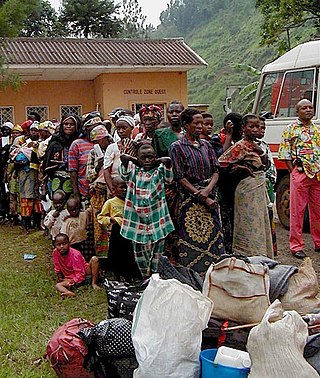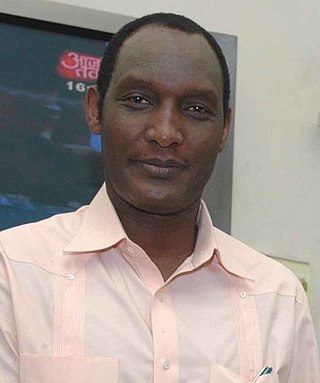| |||||
| Decades: | |||||
|---|---|---|---|---|---|
| See also: | Other events of 2023 List of years in Rwanda | ||||
Events in the year 2023 in Rwanda .
| |||||
| Decades: | |||||
|---|---|---|---|---|---|
| See also: | Other events of 2023 List of years in Rwanda | ||||
Events in the year 2023 in Rwanda .
Human occupation of Rwanda is thought to have begun shortly after the last ice age. By the 11th century, the inhabitants had organized into a number of kingdoms. In the 19th century, Mwami (king) Rwabugiri of the Kingdom of Rwanda conducted a decades-long process of military conquest and administrative consolidation that resulted in the kingdom coming to control most of what is now Rwanda. The colonial powers, Germany and Belgium, allied with the Rwandan court.

Yoweri Kaguta Museveni is a Ugandan military officer, politician and revolutionary who has served as the ninth president of Uganda since 1986. His government is considered autocratic. After Museveni lost the election of 1980, he started the Ugandan Bush War which caused over 100,000 deaths and led to the removal of Milton Obote.

Juvénal Habyarimana was a politician and military officer who served as the second president of Rwanda, from 1973 until 1994. He was nicknamed Kinani, a Kinyarwanda word meaning "invincible".

Paul Kagame is a Rwandan politician and former military officer who is the fourth and current president of Rwanda since 2000. He previously served as a commander of the Rwandan Patriotic Front (RPF), a rebel armed force which invaded Rwanda in 1990. The RPF was one of the parties of the conflict during the Rwandan Civil War and the armed force which ended the Rwandan genocide. He was considered Rwanda's de facto leader when he served as Vice President and Minister of Defence under President Pasteur Bizimungu from 1994 to 2000 after which the vice-presidential post was abolished.

South Kivu is one of 26 provinces of the Democratic Republic of the Congo (DRC). Its capital is Bukavu.

The Interahamwe is a Hutu paramilitary organization active in the Democratic Republic of the Congo and Uganda. The Interahamwe was formed around 1990 as the youth wing of the National Republican Movement for Democracy and Development, the then-ruling party of Rwanda, and enjoyed the backing of the Hutu Power government. The Interahamwe, led by Robert Kajuga, were the main perpetrators of the Rwandan genocide, during which an estimated 500,000 to 1,000,000 Tutsi, Twa, and moderate Hutus were killed from April to July 1994, and the term "Interahamwe" was widened to mean any civilian militias or bands killing Tutsi.

The Second Congo War, also known as the Great War of Africa or the Great African War, began in the Democratic Republic of the Congo in August 1998, little more than a year after the First Congo War, and involved some of the same issues. Eventually involving belligerents from across the African continent, the war officially ended in July 2003 when the Transitional Government of the Democratic Republic of the Congo took power. Although a peace agreement was signed in 2002, violence has continued in many regions of the country, especially in the east. Hostilities have continued since in the ongoing Lord's Resistance Army insurgency, and the Kivu and Ituri conflicts. Nine African countries and around twenty-five armed groups became involved in the war.
The Movement for the Liberation of the Congo is a political party in Democratic Republic of the Congo. Formerly a rebel group operating in the Democratic Republic of Congo that fought the government throughout the Second Congo War, it subsequently took part in the transitional government and is one of the main opposition parties.
Congolese history in the 2000s has primarily revolved around the Second Congo War (1998–2003) and the empowerment of a transitional government.

Presidential elections were held in Burundi on 28 June 2010. As a result of withdrawals and alleged fraud and intimidation, incumbent President Pierre Nkurunziza was the only candidate.
The Rwandan Revolution, also known as the Hutu Revolution, Social Revolution, or Wind of Destruction, was a period of ethnic violence in Rwanda from 1959 to 1961 between the Hutu and the Tutsi, two of the three ethnic groups in Rwanda. The revolution saw the country transition from a Tutsi monarchy under Belgian colonial authority to an independent Hutu-dominated republic.

Faustin Kayumba Nyamwasa is a Rwandan former Lieutenant general who formerly was the Chief of Staff of the Rwandan Army from 1998 to 2002. He was also head of Rwandan intelligence from 1998 to 2002 and served as Rwanda's ambassador to India between 2004 and 2010. Nyamwasa has been an opposition leader in exile since as part of the Rwanda National Congress.

Patrick Karegeya was a head of intelligence in Rwanda. He was a member of the Rwandan Patriotic Front (RPF) group that took power in Rwanda following the genocide and civil war. After becoming a critic of RPF leader Paul Kagame, he was stripped of his rank and jailed. Following a time in exile, he was assassinated in Johannesburg, South Africa on December 31, 2013.

The International Criminal Court investigation in the Democratic Republic of the Congo or the situation in the Democratic Republic of the Congo is an ongoing investigation by the International Criminal Court (ICC) into crimes committed in the Democratic Republic of the Congo (DRC) during the Second Congo War and its aftermath, including the Ituri and Kivu conflicts. The war started in 1998 and despite a peace agreement between combatants in 2003, conflict continued in the eastern parts of the country for several years. In April 2004 the government of the DRC formally referred the situation in the Congo to the International Criminal Court, and in June 2004, prosecutor Luis Moreno Ocampo, formally opened an investigation. To date, arrest warrants have been issued for:

The Allied Democratic Forces insurgency is an ongoing conflict waged by the Allied Democratic Forces in Uganda and the Democratic Republic of the Congo, against the governments of those two countries and the MONUSCO. The insurgency began in 1996, intensifying in 2013, resulting in hundreds of deaths. The ADF is known to currently control a number of hidden camps which are home to about 2,000 people; in these camps, the ADF operates as a proto-state with "an internal security service, a prison, health clinics, and an orphanage" as well as schools for boys and girls.

On 25 April 2015, the ruling political party in Burundi, the National Council for the Defense of Democracy – Forces for the Defense of Democracy (CNDD-FDD), announced that the incumbent President of Burundi, Pierre Nkurunziza, would run for a third term in the 2015 presidential election. The announcement sparked protests by those opposed to Nkurunziza seeking a third term in office.
Operation Kitona was a Rwandan/Ugandan offensive that marked the beginning of the Second Congo War. Rwanda hoped to depose Laurent-Désiré Kabila and install a government more favorable to Rwanda's interests by quickly taking control of Kinshasa and the strategic western province of Bas-Congo. On August 4, 1998, joint Rwandan and Ugandan forces launched a surprise attack on Kitona airbase in Western Congo using hijacked civilian airliners. While initially successful in taking control of major ports and infrastructure, Zimbabwean and Angolan intervention prevented the Rwandans and Ugandans from taking control of Kinshasa. The invading forces were forced to withdraw to the jungles of Angola until they were evacuated by air to Rwanda in late 1998.
Events in the year 2021 in Uganda.
Events in the year 2022 in Uganda.
Events in the year 2023 in Uganda.